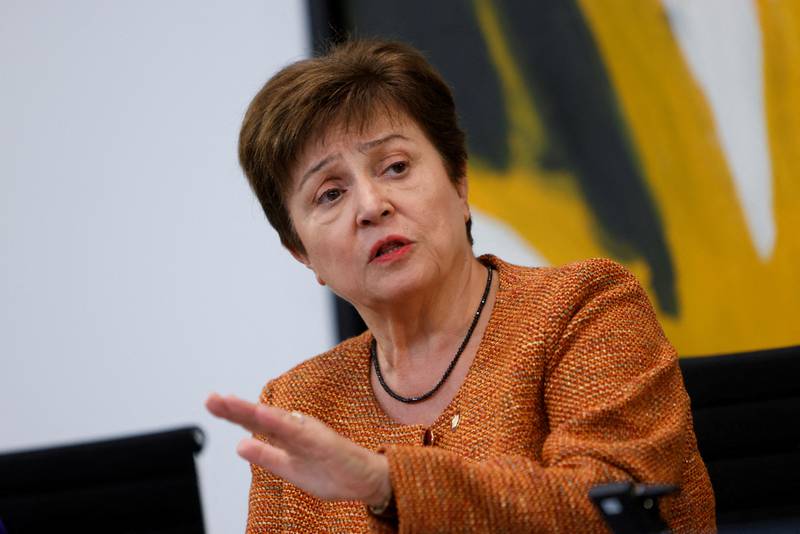Fund's managing director says the global economy faces 'a tough year, tougher than the year we leave behind'
IMF chief Kristalina Georgieva repeated an earlier warning that a third of the global economy will be in recession this year. Reuters
Oil prices oscillated on the first trading day of the year amid demand concerns and a warning from the International Monetary Fund's managing director that a third of the world's economies may slide into a recession in 2023.
After opening about 1 per cent lower and then climbing higher, Brent, the benchmark for two thirds of the world’s oil, fell 3.40 per cent to $82.99 a barrel on Tuesday at 9.08pm UAE time, while West Texas Intermediate, the gauge that tracks US crude, declined 3.15 per cent to $77.73 a barrel.
Brent averaged $103.70 a barrel in 2022, gaining about 10 per cent annually, after jumping 50 per cent in 2021, while WTI ended up about 7 per cent last year, following a 55 per cent surge in 2021.
This was the second annual gain for the oil market despite last year's price volatility, which was exacerbated by the Ukraine war that disrupted global supplies.
“US crude is struggling to take over the 50-day simple moving average resistance, as the slowing China story — despite the reopening — and the mild winter in Europe weigh on the bulls’ appetite to boost the price rally,” said Ipek Ozkardeskaya, a senior analyst at Swissquote Bank.
“But the oil bulls may have not said their last word yet.
“The limited oil supply, Opec’s willingness to keep oil prices sustained to fill in the coffers, the switching demand from gas to oil, the Americans who sold 180 million of their strategic petroleum reserves last year — but who will also need to refill them as soon as possible — and possibly around $70 to $80 per barrel levels, and the slow green transition, all hint that the downside in oil will likely remain limited.”
Oil prices are expected to remain firm, with limited downside risks in 2023, Saudi Arabia's Al Rajhi Bank.
They will be aided by lower Organisation for Economic Co-operation and Development stock levels, supply shortfalls on account of the move by Opec+ to cut output by 2 million barrels a day, sanctions on Russian supply and US plans to refill its Strategic Petroleum Reserve.
The lender expects crude prices to average $79 a barrel in 2023.
Brent soared to a 14-year high of close to $140 a barrel in March after Russia’s invasion of Ukraine, but sluggish growth in China, the world's second-largest economy and the biggest importer of crude, and the strong possibility of a recession in several economies weighed on the market.
“The reopening of China’s economy will be a fundamental force in the ebbs and flows for energy markets this year, particularly if there is strong demand for international travel from Chinese consumers,” Edward Bell, a senior economist at Emirates NBD, said in a research note on Monday.
“Russia will face more disruption to its energy markets as another EU embargo comes into effect in Q1 [the first quarter], this time on refined products, and markets will continue to adjust to the effects of the price cap on Russian oil.”
China's economy is forecast to accelerate 4.4 per cent in 2023, after an estimated 3.2 per cent expansion last year and 8.1 per cent growth in 2021, according to the IMF.
A slowdown in China’s economy last year added to global supply chain disruptions and crimped global growth amid renewed Covid-19 outbreaks and the country's zero-Covid approach that led to new lockdowns.
In an interview with the US news channel CBS on Sunday, IMF managing director Kristalina Georgieva said the global economy faces “a tough year, tougher than the year we leave behind”.
“We expect one third of the world economy to be in recession,” Ms Georgieva told CBS’s news programme Face the Nation.
“Why? Because the three big economies — US, EU, China — are all slowing down simultaneously.
“While our baseline avoids a global recession over the next year, odds of one are uncomfortably high. Europe, however, will not escape recession and the US is teetering on the verge.”
The Washington-based lender had already cut its growth forecast for 2023 in October and warned of a cost-of-living crisis this year.
The fund cut its growth forecast to 2.7 per cent this year, 0.2 percentage points lower than its July forecast.
It had also warned of a 25 per cent probability that output could fall below 2 per cent in 2023, the weakest growth profile since 2001 except for the 2008 global financial crisis and the acute phase of the Covid-19 pandemic.
“The worst is yet to come and for many people, 2023 will feel like a recession,” IMF chief economist Pierre-Olivier Gourinchas said in October.
The fund expects a global output loss of about $4 trillion by 2026, equivalent to the size of the German economy — Europe's largest.
Craig Erlam, a senior market analyst at Oanda, said the outlook remained “highly uncertain, though which should ensure oil prices remain highly volatile”.
An December 5 agreement — by the EU, Australia and the Group of Seven advanced economies — that places a price cap of $60 on global purchases of seaborne Russian crude has had little impact so far, Mr Erlam said.
“But that could change if oil prices keep moving higher, nudging Russian crude ever closer to the cap level and forcing some very difficult decisions.”
